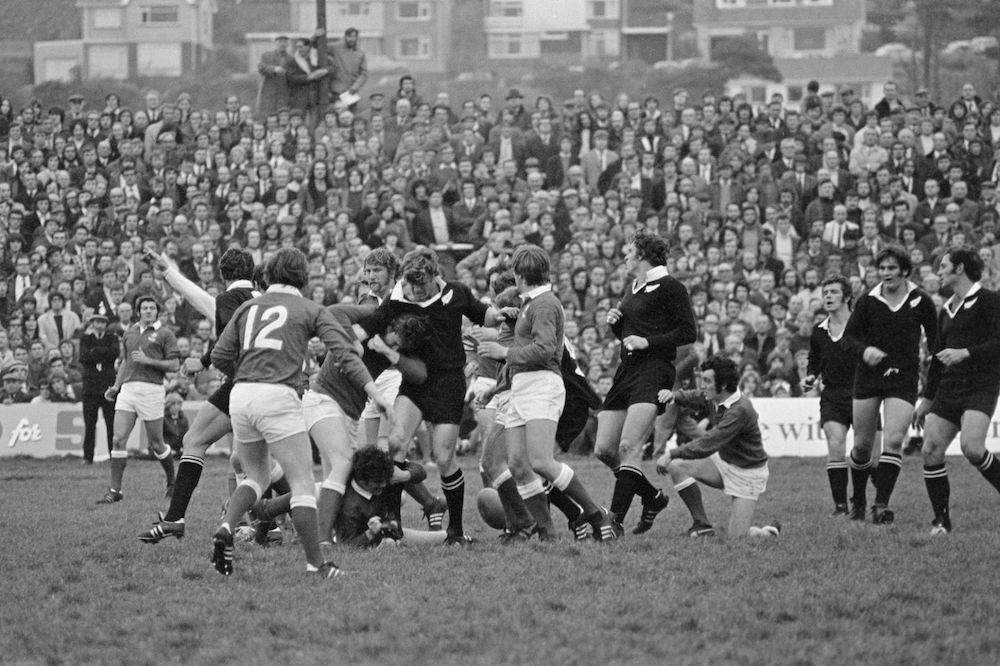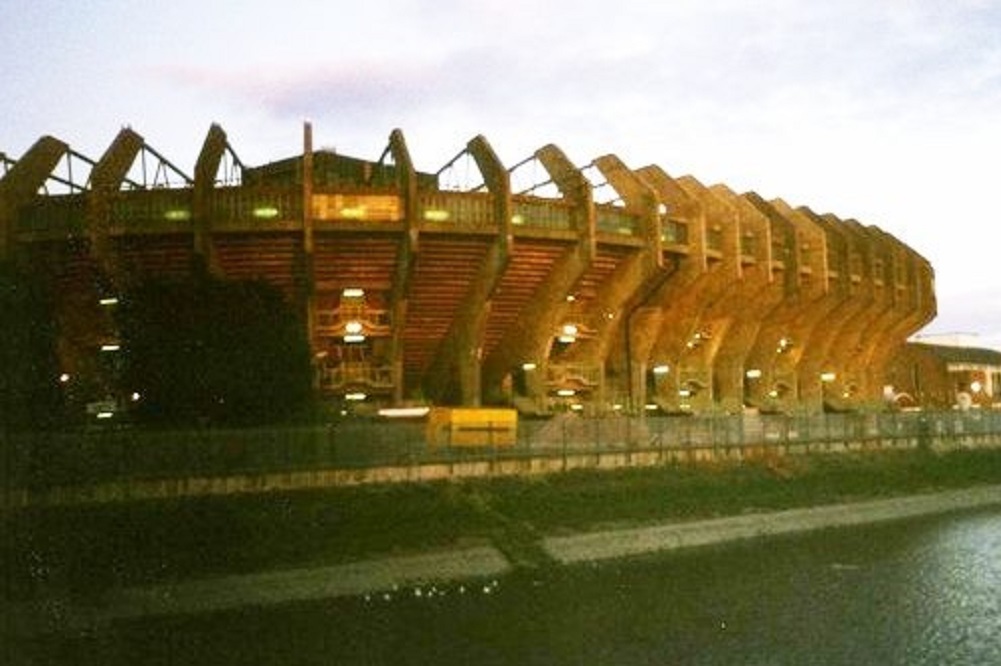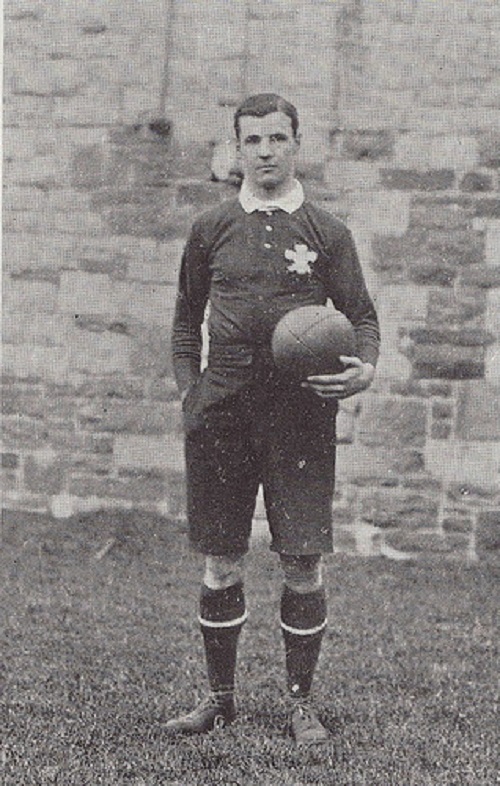Who beat the All Blacks? We did!

As Wales take on New Zealand at Principality Stadium today, John Geraint, author of ‘The Great Welsh Auntie Novel’, and one of Wales’s most experienced documentary-makers, recalls some local heroes who’ve triumphed over the men in black. ‘John On The Rhondda’ is based on John Geraint’s popular Rhondda Radio talks and podcasts.
John Geraint
The All Blacks are coming! Today, Wales renews a rugby rivalry that spans more than a century and the entire planet. As far as I know, New Zealand has never sent a team to play in the Rhondda – unlike the Australians, whose national team faced the might of Penygraig in 1908.
But there are some Rhondda players who can respond to that famous rugby chant ‘Who beat the All Blacks?’ with a resounding ‘We did!’
For the rugby fan, there’s no disputing the fact that the All Blacks have a special aura.
Against Wales, for far too long now, it’s been an aura of invincibility. It’s said whilst other teams remember their victories, New Zealand remembers its defeats, and perhaps that why there are so few of them.
Sometimes, there’s been a dark edge to their play – a determination to win at any cost that seems counter to the spirit of the game. But when they’re at their best, it takes something really special to beat them.
Their excellence encourages their opponents to rise the occasion.
I don’t know about you, but away from sport, there’s a handful of people I’ve met in my life who’re a bit like that – people of real backbone, people who stick to their principles even if it’s not in their narrow self-interest. They challenge you, bring out the best in yourself, not to beat them, but to live like them, to join them in living wholeheartedly for the best.
Anyway – back to the rugby: I have been fortunate enough to be there in person to see the All Blacks beaten, and it did take something special.
In January 1973, the Barbarians famously won in Cardiff. Gareth Edwards scored that try. But it was Tylorstown’s John Bevan whose determination took him over the line for the crucial score that took the game beyond New Zealand’s grasp.
John Bevan!
The big wing already knew what it took to beat the men in black – he’d played for the Lions in the First Test in New Zealand in 1971. And he’d sprinted forty yards to power over for a try for Wales against the All Blacks, the month before that magical Barbarians game.
Two other Rhondda men had crucial roles in broadcasting the Barbarians’ sorcery – TV director Dewi Griffiths, and commentator Cliff Morgan.
Gleam and glory
Cliff Morgan also knew the thrill of beating the All Blacks as a player. In 1953, the Trebanog man played outside half for the Cardiff club side when they defeated New Zealand 8-3.
His performance that day merited not just praise in the sports pages, but an editorial in the Western Mail: ‘We do not think that the passing of the years will ever dim… the gleam and glory of the historic encounter at the Cardiff Arms Park on Saturday, or tarnish the memory of Cliff Morgan’s darting and swooping across the turf and skimming past every obstacle like a swift at play.’
Cliff Morgan’s half-back partner that day was Ystrad-born Rex Willis, later the owner of chain of cinemas across South Wales. Outside them, on the wing, was Penygraig’s Gareth Griffiths, the eldest of four brothers who all played for Cardiff.
Gareth had won schoolboy caps for Wales when he was at Porth County. He, Rex Willis and Cliff Morgan were picked for the international fixture against New Zealand later on that 1953 tour.
The three of them were joined in the full Welsh side by Penygraig hooker Dai Davies.
In the second half of the match, Gareth Griffiths dislocated his shoulder and had to leave the field. No substitutes were allowed in those days, even for injuries. So Gareth simply lay down on a blanket on the touchline, grimaced whilst the shoulder was put back in place by the WRU doctor, and then joined the fray again.
Wales triumphed 13 points to 8, and so the Rhondda quartet – Cliff Morgan, Rex Willis, Gareth Griffiths and Dai Davies – were all part of that last Wales team who can say ‘we beat the All Blacks!’

He was there!
‘We Beat The All Blacks’ – it was the title we gave to a TV documentary I was involved in making, about the famous Llanelli victory in 1972.
The players in that match had some great stories to tell on camera – about what happened before, during and after the game on the day when, in a town that boasted several breweries, they drank the pubs dry.
In another programme I oversaw, Eddie Butler went out to New Zealand to tell the story of how the 1971 Lions beat the All Blacks in their own backyard.
But there was one much older victory over New Zealand which I was determined to make a programme about – and that was a real challenge. After all, there was no archive footage of the game played in Cardiff in 1905, and everyone involved was long dead.
But when it came to the celebrating the centenary of the match, I had personal reasons to make sure it was marked properly on screen.
Although there was no film to be had, the occasion was vivid in my mind’s eye: my grandfather, Tommy John, was one of the 47,000 people who crowded into Cardiff Arms Park on that December afternoon and saw Wales win.
Grampa never tired of telling us about that day, and when he died, nearly seventy years afterwards, it was one of the facts of his life the Rhondda Leader highlighted in his obituary: he was there!
Virtual Arms Park
So in memory of Tommy John, as much as of the match itself, I set about getting a commission to make a TV film to mark the centenary.
My idea – since there was no footage and no living witnesses – was to reconstruct the match using the detailed, play-by-play newspaper accounts published at the time.
We had two full teams in period costume, who were drilled in how to replay the game’s key moves in exact detail. And using what was then state-of-the-art computer graphics, we morphed thirty well-togged-out ‘extras’ into a crowd of 47,000, filling our ‘virtual’ Arms Park.
It looked terrific – and it sounded great too, because that was the first time the crowd took up the singing of our national anthem in response to the New Zealand haka.
As our camera panned over the crowd we’d dressed in Edwardian finery, the man who first picks up the cue to sing Hen Wlad Fy Nhadau along with the team is – in my mind anyway – none other than my grandfather, Tommy John.

Championship decider
Tommy John wasn’t the only Penygraig man there that day.
On the field of play, wearing number 3, as centre-threequarters did in those days, was a near neighbour of his. He’s listed in the official match programme along with the club he played for: Willie Llewellyn (Penygraig).
And it was a dazzling pre-planned move featuring the threequarters which won the game for Wales, a game between the era’s two outstanding sides which had been billed as a world championship decider.
New Zealand always claimed they’d scored an equalising try of their own; but with a mountain of forensic evidence culled from those newspaper reports, our film came to the firm conclusion that the referee was perfectly correct to disallow their score.
And the jury of the Celtic Film Festival, no less, agreed with our verdict – they awarded us their top prize, the Gold Torc for Spirit of the Festival. So we must have been right!

Tonypandy Riots
Willie Llewellyn was probably the first Rhondda man who could say he beat the All Blacks. And there was a strange upshot to his part in that famous victory.
Five years later, during the industrial dispute that’s become known as the Tonypandy Riots, there was widespread damage to the retail premises of Dunraven Street.
Every shop, it was said, had its windows smashed in by the vast crowd of miners who’d been locked out of their places of work.
Every shop, bar one – the chemist’s owned and run by a Mr Willie Llewellyn of Penygraig.
‘John On The Rhondda’ is broadcast at about 3.15pm as part of David Arthur’s Wednesday Afternoon Show on Rhondda Radio
All episodes of the ‘John On The Rhondda’ podcast are available here
John Geraint’s debut in fiction, ‘The Great Welsh Auntie Novel’, is available from all good bookshops, or directly from Cambria Books
Support our Nation today
For the price of a cup of coffee a month you can help us create an independent, not-for-profit, national news service for the people of Wales, by the people of Wales.






Sad to say Wales’ recent record against the all blacks is frankly pathetic – so much so that you do wonder why they bother to play us at all?